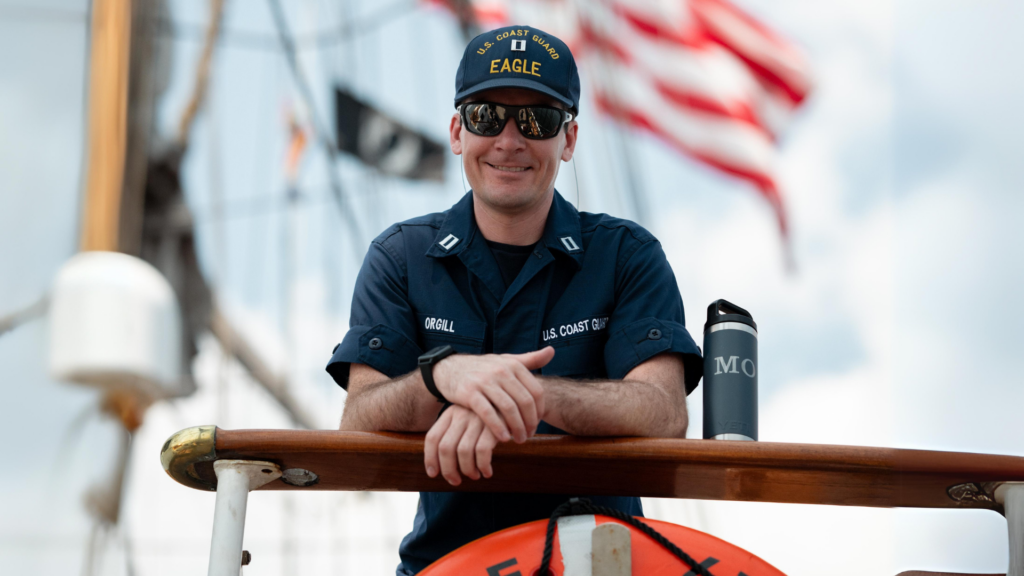A career in the Coast Guard seems worlds away from startup culture, right? Think again! For Matthew Orgill, a graduate student studying Naval Architecture and Marine Engineering at the University of Michigan, innovation and entrepreneurship aren’t just confined to Silicon Valley – they’re essential tools to amplify impact in any field.
From fundraising for historic nonprofits to solving real-world defense challenges, Matthew’s story is one of adaptability, innovation, and impact. Empowered by the Center for Entrepreneurship’s (CFE) Innovation for Impact: Defense and Security course and the Graduate Certificate in Innovation and Entrepreneurship, Matthew is charting his own course toward a career where creativity knows no bounds.
Matthew’s entrepreneurial fire was ignited early on. In high school, he worked with a local nonprofit called InfoAge. The nonprofit, based on a historic campus known for its role in U.S. military communications, relied heavily on community efforts to stay afloat. Matthew fondly remembers leading an annual fundraiser by transforming part of the Army camp into a haunted attraction.

“In retrospect, many of our efforts were in line with entrepreneurial principles. We worked tirelessly on our business model, did a ton of market research, customer acquisition, and retention—which brought in the majority of this nonprofit’s income for almost a decade,” Matthew recalls. It was an early lesson in the importance of understanding your audience, refining a business model, and delivering an experience that resonates.
After high school, Matthew attended the Coast Guard Academy, graduating in 2016. Since then, he’s served as a Coast Guard Officer, a role where Matthew sees strong parallels between the demands of military life and entrepreneurial principles.
“At sea, you have to be proactive, you develop an acute sense for risk-tolerance. When conducting new missions or employing new technology, innovation is key. In remote regions, you have to be resourceful,” he explains. Ashore, his role as a Port Engineer also demanded entrepreneurial skills like networking and relationship building—essential for completing ship repairs on time and under budget.
When Matthew arrived at the University of Michigan to pursue his Master of Science in Engineering, he hoped to diversify his education. A recommendation from a U-M alumnus led him to the Center for Entrepreneurship.
“I found it was exactly what I was looking for,” Matthew says.
One of the most impactful moments in his entrepreneurial journey came last semester when he participated in the Innovation for Impact: Defense and Security course. His team worked with the U.S. Air Force’s Central Task Force-99 to innovate solutions for detecting and defending against small unmanned aerial aircraft.
“I was amazed at the level of access we received from dozens of companies who were excited to talk and share information with us,” he reflects. What stood out most to Matthew was the wealth of resources the CFE provided to turn their project into a real entrepreneurial venture.
While Matthew won’t be launching a startup right now due to his commitment to the Coast Guard, he was struck by how much more feasible the process seemed with CFE’s support. “If I didn’t have that commitment, it would be an exciting opportunity to launch a startup.”
This year, Matthew will be finishing both his master’s program and the ENTR Graduate Certificate. “I’ve never had this number of elective choices before in my academic career, so I’m excited to take courses that I believe will have a real-world impact on my career,” he shares.
As for advice to future ENTR students, Matthew is clear: “Jump in early. Take ENTR 500 at your first opportunity. It provides a great introduction to the CFE, and if you like it, you can then quickly enroll in the ENTR program or sign up for other CFE programs or courses.”
When he graduates, Matthew will return to his role as a Coast Guard Officer. Wherever his next assignment takes him, it’s clear that Matthew’s entrepreneurial spirit will continue to shape his journey.

